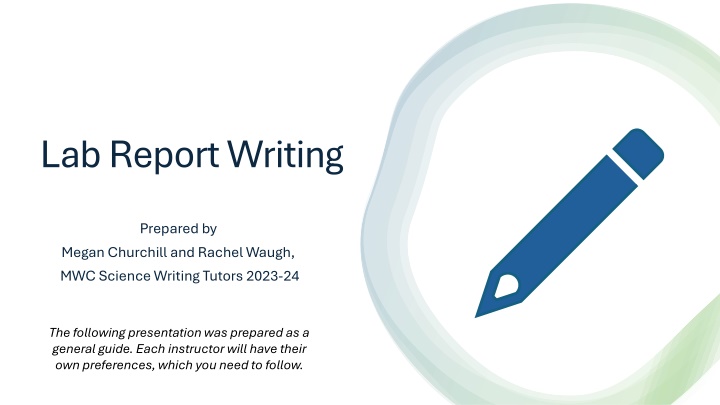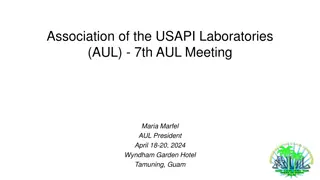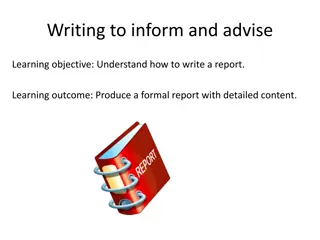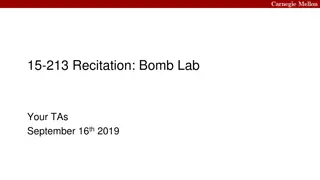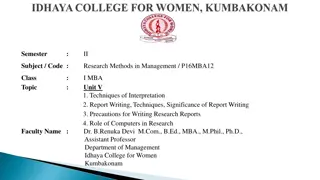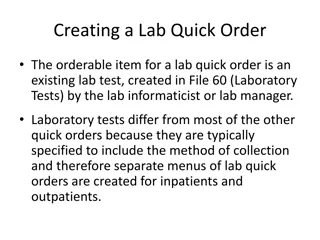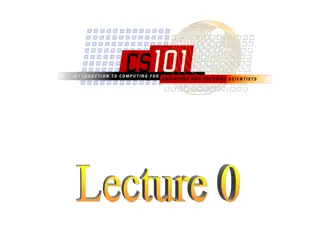Lab Report Writing
Learn how to write effective lab reports following specific guidelines outlined by Megan Churchill and Rachel Waugh. Understand the structure, formatting, and content requirements for lab reports. Covering sections like title page, abstract, introduction, methods, results, discussion, and conclusion, this comprehensive guide provides valuable tips for scientific writing.
Download Presentation

Please find below an Image/Link to download the presentation.
The content on the website is provided AS IS for your information and personal use only. It may not be sold, licensed, or shared on other websites without obtaining consent from the author.If you encounter any issues during the download, it is possible that the publisher has removed the file from their server.
You are allowed to download the files provided on this website for personal or commercial use, subject to the condition that they are used lawfully. All files are the property of their respective owners.
The content on the website is provided AS IS for your information and personal use only. It may not be sold, licensed, or shared on other websites without obtaining consent from the author.
E N D
Presentation Transcript
Lab Report Writing Prepared by Megan Churchill and Rachel Waugh, MWC Science Writing Tutors 2023-24 The following presentation was prepared as a generalguide. Each instructor will have their own preferences, which you need to follow.
Outline 1. 2. 3. 4. 5. 6. 7. 8. 9. 10. Discipline specific tips 11. Additional resources General tips Title page Abstract Introduction Methods Results Discussion Conclusion References
General tips Lab reports should be written in third person (do not use I , we , our , you ). Lab reports should be written in past tense (because the study was already completed). It is important in science writing and reporting to be specific and accurate. Science writing is also direct and clear. Do not include your opinion, unless requested by your instructor. Your hypothesis is not an opinion; it is an educated guess. Avoid personal bias state the facts as best as you can. All lab reports follow a similar structure: abstract, introduction, materials & methods, results, discussion, and conclusion.
Title page A title page may be required, dependent on the course or instructor. Follow the recommendedformatting style, typically found in the course syllabus. Make your title informative and specific to the study/lab completed.
Abstract This section may not be required in all lab reports, so read the assignment directions clearly, and if you are unsure, ask your professor/ lab instructor if an abstract is required. Typically, the abstract is the last section you will write in a lab report, although it appears first. An abstract is a general overview (typically 250- 300 words) of the study/ lab you completed. An abstract will include - the purpose or objective of the study/ lab, - a brief description of the methods used, - key findings, and - significance/conclusion of your results.
Introduction The introduction section sets the reader up for the lab. It includes necessary background information relevant to the lab. It provides a brief overview of similar studies and highlights how your lab will contribute. The introduction section should end with the purpose of the lab and a hypothesis (what you think will happen).
Materials and Methods In the materials and methods section, describe how you completed the lab, who was involved in the lab (participants, if any), and what equipment was needed. Provide enough detail so that the reader could repeat the lab with the same materials and methods that you used. List any dependent, independent, and control variables used.
Results List and describe what you found (What were you measuring? Are there any relevant outcomes or comparisons?) Do not interpret your results. Save that for the discussion section. Use tables and figures to supplement your written description.Tables and figures should be clear, easy to understand, and able to stand on their own. Refer to formatting standards for axis and table/ figure titles.
Discussion In the discussion section, you are explaining and interpreting your results (What do your findings mean?). Compare your results to other similar studies (What was similar, what was different?). Compare your results to your hypothesis. Explain the significance of your results. Include strengths and limitations to the study you completed. Include recommendations for future research based on what you found.
Conclusion The conclusion of a lab report is typically around 1 paragraph in length (it is the shortest section of the report). Summarize the lab and your results. Speak to the implications of your results. Do not add new information in the conclusion section.
References For formal lab reports, cite any sources used or consulted in the writing of your lab report. Cite these in-text (in the body of your report) and in a reference list (placed at the end, after your conclusion). Follow yourcourse's recommendedreferencin g style, typicallyfound in the course syllabus. If unsure, ask your instructor.
Discipline-Specific Tips Applied Human Nutrition: The format of a report can differ based on the course. o For example, some may be more of a 'question and answer' format.However,many of the same science and lab writing tipsstill apply(e.g., are there any relevant standards forcomparison?) Biology, Chemistry, and Physics: Ensure you record units for any measurements and calculations. Refer to Scientific Nomenclature guidelines as relevant (helpful resource linked here). Psychology: The methods section may require specific sub-headings, such as o Participants or Subjects o Design (e.g. variables and conditions) o Materials or Apparatus (and measures) o Procedure (step-wise process/protocol)
Additional Resources https://libguides.msvu.ca/ld.php?content_i d=34487147 https://advice.writing.utoronto.ca/types-of- writing/lab-report/ https://libraryguides.mcgill.ca/labreports https://libguides.msvu.ca/ld.php?content_i d=34487148 https://advice.writing.utoronto.ca/types-of- writing/science/ Psychology specific: https://dal.ca.libguides.com/c.php ?g=257176&p=1718032
